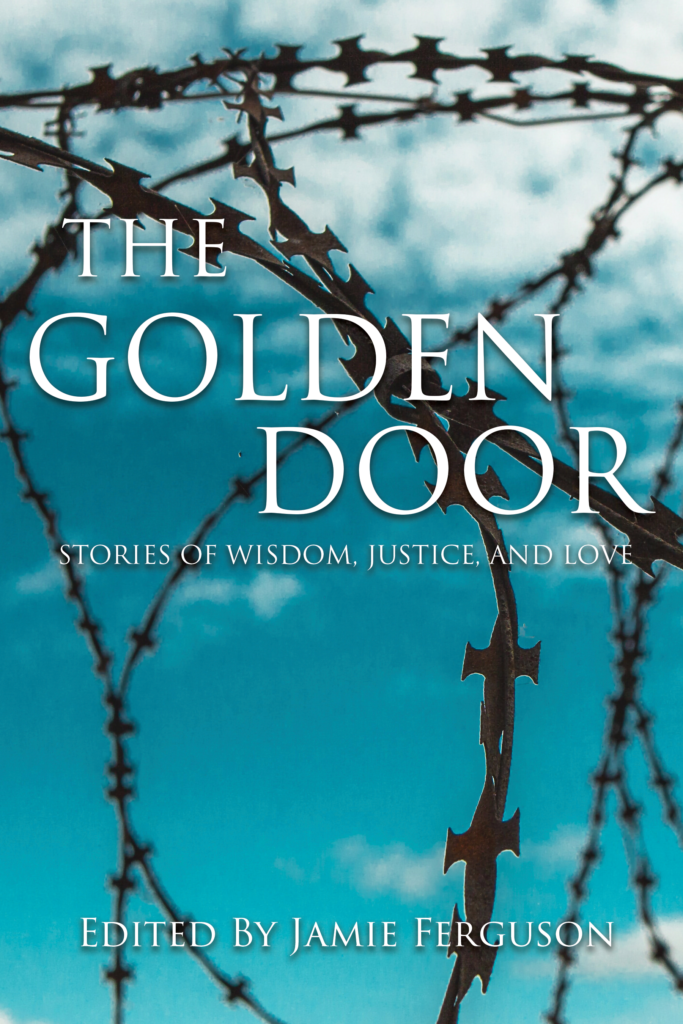
An American temporarily loses his sight in an accident in Beirut in Bob Sojka’s “Transient Pains.” While recovering, he tells his nurse stories about growing up in an immigrant family in Chicago in the 1950s, where stereotyped animosities arose among people of different origins.
“Transient Pains” appears in The Golden Door, a collection of stories showing the impact on people when they’re treated as “the other,” whether they’re immigrants to a country, a group of targeted within their own country, or something else besides. The title refers to Emma Lazarus’s welcoming words inscribed on the plaque on Statue of Liberty, “I lift my lamp beside the golden door!”
Tales of mistreatment of “the other” abound in historical or religious writings from around the world and through all time. But there are also plenty of examples of people helping each other, caring for one another, learning about each other. Sometimes in big ways, sometimes in small—but they all add up.
All proceeds will be donated to Doctors Without Borders and the ACLU.
Find The Golden Door
Universal Book Link ~ Amazon ~ Apple Books ~ Barnes & Noble ~ Kobo ~ BookBub ~ Goodreads
Excerpt
Busia Karcz couldn’t understand the English her children or grandchildren spoke to her. Out of the necessity she created, we sputtered out pidgin Polish sentences, which became the linguistic bars that defined the prison cell of our relationships with her.
She was an Old World peasant. She had no schooling. She “knew what she knew” as a result of an unschooled upbringing that informed her vision of the world as much as it blinded her to the contradictions in her own beliefs. She hated Gypsies, but had memorized and lived by their fables, aphorisms and home remedies. She “treated” her grandchildren to kiszka (blood sausage) and zimne nóżki (jellied pig’s feet with vinegar)—prized offerings that we wrinkled our noses over and refused, much to her disappointment and bruised pride, as well as our parents’ anger. Her meals were often accompanied by lectures to her daughters-in-law about frugality in the kitchen, in the closet, in household furnishings, and in personal grooming. Her arrow-straight hair remained jet black to the day she died and reached her ankles, albeit she barely stood five feet tall. She wore no makeup.
I was shocked one day at the age of four to find her picture in a Disney children’s book, offering an apple to a skeptical Snow White. “Why is Busia’s hair white in this picture?” I asked my mother. I don’t remember the answer, but I remember the shocked look on her face.
—from “Transient Pains” in The Golden Door by Bob Sojka
About Bob
Bob Sojka is a retired environmental scientist and author of hundreds of research papers, book chapters and policy documents. He’s dabbled in fiction since the third grade. In recent years he’s published 16 stories at on-line zines like NewMyths.com and Perihelion, as well as in print anthologies. The most recent include “Blood Storm” in Fiction River’s collection Pulse Pounders: Adrenaline, edited by Kevin J. Anderson, “Don’t Forget”in New Myths’ “Best of” Anthology entitled “Passages,” and “A Fare Cut” in the the Bundle Rabbit anthology entitled “Stars in the Darkness”.
His novelette “Feolito’s Gift“ is available for Kindle on Amazon. Bob also writes the weekly column “Inside Politics“ for the Times News, his Idaho home-town newspaper. Bob’s stories explore the boundaries and meaning of human spirit, character and consciousness across a spectrum of story genres and styles.
Find Bob
Find The Golden Door
Universal Book Link ~ Amazon ~ Apple Books ~ Barnes & Noble ~ Kobo ~ BookBub ~ Goodreads
